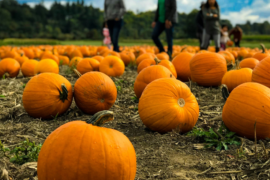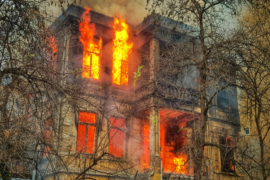Maggie cuts. By the number of slashes, hash marks, crisscrosses, and scars, she’s practiced in hieroglyphs, a Rosetta Stone to translate her ancient agony into a modern-day understanding. One pill, two pills, three pills, more.
She talks with her therapist but like a censored film it’s what’s left out that is more telling, imagines that her soul is small because the town is small, that her soul is shrinking because the town is shrinking, that if she lived in a big city her soul would be large, expanding, takes one pill, two pills, three pills, more, to control polar swings which collapse at times into an equator of blood-letting.
Two houses down Joseph cuts.
He goes without gloves pulling thorns for the pain, uprooting bramble to bind like corn stalks, and throw into the back of his truck for the landfill. He welcomes the cut of branches he lops and severs and carries in unassembled bundles as he mulls why he didn’t finish college and he’s twenty-eight doing the job a twenty-year old should do and he loves the dirt and effort but his body’s dying, his body’s dying, being bled by his self-thwarted need for a non-supervised job.
He drinks. He drinks at lunch.
He still lives with his father.
He smokes but no longer gets high. just soft, forgetful, regretful, unable to attract, always a friend, never a lover, traces the scars from French broom and manzanita like a mad line drawing on his forearms and biceps, welts from poison oak, pockmarks from rosehip thorns, a graphic novel where the hero dies alone.
Joseph does yardwork for the apartment complex where Maggie lives with her parents. He has heard her yell at her father for entering her room minutes before he takes her to ER. He has heard her yell at mother, who often wears earbuds he thinks to soften Maggie’s blare. He likes how Maggie dresses, all covered up top and wearing a skirt often that’s too short, showing a lot of leg. He does not ogle, just glances.
Joseph has talked to Maggie twice, once about growing breasts if he smokes too much weed, but she reassured him that he was skin and bones, bordering on looking maltreated, working on malnutrition. He laughed, and she smiled.
The second time Maggie shared that she hadn’t worked for over a year, kept hiding in her room so she wouldn’t have to talk to her parents, had one month where she only went to the kitchen once a day for food and never anywhere else.
The story of my life, Joseph said, except I go places for work but they all look the same, have the same problems, the same people. I’m not in a rut. I’m mobile. It’s the world’s that in a rut.
She said she was on What’s App, gave him her address, but he didn’t text. He never knew what to say.
Text like you just talked to me, she said. I’d like that.
Joseph texted, and waited, and waited. Two days and no return text, so he stopped texting. He still admired Maggie from afar, maybe more so after she cut her hair jagged short and went without makeup. She was edgy, depressed, but had a flare to her. He liked that.
On Thursday of the next week that Joseph’s father died from coughing on his own spit, Joseph had run into Maggie two corners down from where she lived on a bright moonlit night when the sprinklers from the county probation center started and would not turn off, turning the street into a small stream. The first workers on site had broken the timer, then downstream had broken a hose, and water shot out at eight gallons a minute.
Joseph had been sitting in his truck getting high watching the fiasco. Maggie had been walking angrily to avoid calling back her mother, who was in Brooklyn visiting her half-sister. Maggie had knocked on the window, but Joseph had not acknowledged, so she had opened the door and whacked him in the arm.
You are either shit-faced or high, she said.
High, he said. Very high. Omnipotent stuff.
Maggie talked for several minutes, almost giddy.
Joseph did not speak, but in his brain, he wondered if her conversation sounded like Beethoven, in a way, all those lows and highs and she had a voice that sounded like an orchestra, so many inflections as if different instruments were playing.
You haven’t heard a word I’ve said, have you, Maggie said.
I’ve heard all the words, Joseph replied. Every word.
Maggie stood back and looked at Joseph slumped over with one hand on the steering wheel at the ten o’clock position.
You can’t drive like that.
I usually don’t. I’ll just sit here until morning.
What if the cops come to direct traffic because the water won’t shut off?
They know me. They know I sit. I’ll be fine.
You should walk. Walk with me. Walk me home, and then if you prove you can walk, you can walk back. It’s only a few blocks, a little time.
Joseph got out of the truck, fumbled for his keys, and locked it. He hitched up his pants and made his belt a notch tighter.
Whoa, Maggie said, I thought you were gonna take down your pants, like a pervert or something.
Nope. I don’t want to walk on the bottom back of my jeans. Frays them. Jeans sag on me. Always have.
They walked to Maggie’s. She asked him in but Joseph said he smelled from a day’s work and needed to shower.
I agree you smell, she said, but I’ve got a shower. You can shower and we can talk until you’re not high any more.
Joseph laughed. I’m always high. She snuck him into her room through a side door and he showered. He put on the same clothes except left off his sweatshirt and shirt. He smoothed back his hair, revealing his face fully to her for the first time.
You look like a beat-up surfer, she said, with your hair all wet and combed back.
That’s as close as I’ll get to a wave, he laughed.
She motioned to an egg chair and he sat. Maggie sat at the corner of her bed. She felt odd with Joseph sitting in the chair. The chair had always been occupied by a parent, with either sympathy or direction coming out of their mouth. She noticed his forearms, the massive number of small scars that seem to cobble together into skin, a chaotic crosshatch. Small scars on his pectorals and his belly glistened, and she could tell that the scars, in how they widened from the initial scratch, had never been treated. Some looked as wide as worms.
Your arms and chest look like stained glass, Maggie said. The silver parts look like the lead.
Joseph tried to hide his chest, folding his arms over. Self-conscious about my boobs, smoking weed as much as I do.
Maggie crowed, then clapped her hand over her mouth. You don’t have boobs. I’ve told you, you’re super skinny.
I worry, Joseph said, that I’ll be one of those guys that you see at the 7-11 that wears an extra-large t-shirt hoping it will hide them.
If you wore an extra-large t-shirt, you’d disappear in it. You could literally turn around in an extra-large, she laughed.
She asked if she could touch his arms and for reasons he could not understand, said sure.
She first ran her index finger over the left arm and then the right, from the large knuckles of his hands up the bicep, back to the elbow, and down the softer flesh of the underside.
You’ve been at your job a long time, she said.
All my life since sixteen.
What does that do to your arms, makes your skin look like lace?
Thorns mostly. Poison oak. Roses. Citrus trees. That and all the spots where leaves come out of branches. They harden, you know. Become quite like a prong.
I would have thought they just would scratch you, but these are indented scars, Maggie said.
Yep. The doctor said that I keep cutting them open before they heal, so that’s why my skin looks like that. It’s tough skin, you know, but it’s all cut up into these little tiny segments, and where all those little white lines are, those aren’t so tough. They slice open pretty easy. I bleed all the time.
Maggie smiled, elated. She had a sudden sense of courage. She rolled up her sleeves, revealing the hundreds of slash marks on her arms.
I cut, she said. Not every day or week, but often enough. It’s a bunch of reminders that I want my life to end but I don’t want it to end right now. She laughed nervously, hoping Joseph would understand.
You go to therapy for that, he asked.
Yes, solo and group.
Does it help?
Yes, most of the time.
Joseph came to her and asked if could see her arms. He cradled her hands more like a lover than a doctor. His tenderness seemed to seep into her skin and settle in her chest.
You’ve got some deep cuts, stitches, tracks. Must have been a difficult time, he said. Not just cutting.
He spoke with a tenderness Maggie had never felt before.
No, not just. I’ve tried twice, Maggie said. Both times I ended up calling my father for help. But that was years ago.
Still fascinated?
Yes. You know, my dad has been saying, and I’ve been thinking, a job that’s outside would help me. I feel pretty isolated. Alone even with my mother home.
Joseph twirled hairs on his beard.
Yeah, I just lost my father, he started, but to tell you the truth, it’s not much different. I was always high and he always fell asleep after dinner. I worked hard and late a lot, always have equipment to store or change out of my truck or a landfill run to make before four, which means I didn’t get home until six. Then I’d get high and watch a show or something.
Do you have a girlfriend? I mean, if you like girls.
Joseph laughed. No, no girlfriend. You?
Maggie shook her head no. I’m not looking for a relationship. Too fragile. Too prone to pick up something sharp, she laughed. Scares them off. Just looking for a friend.
Joseph nodded. Me too. Not just someone to get high with, but it would be nice once in a while to get a pizza and watch a movie or go down by the river and just watch it roll by. I do that a lot. But my business has expanded since Covid. Seems like everyone works and commutes and can’t tend to anything green any more. A town may shrink in population, but the trees and bushes just keep on growing. My dad said I needed help, can’t keep working seven days a week.
What kind of work? I might be able to help you.
Joseph smiled. Slicing. You slice up the landscape, and the landscape slices you back. You wouldn’t need to cut your arms anymore. You’d earn money.
Maggie leaned over and ran her hands over his forearms, this time with her whole hand. Your skin is beautiful. It looks like a spider’s web. Or a snake skin. It glistens, those white and gray channels in your skin.
I’m not very careful when I work, Joseph said, I should wear gloves and arm skirts, but I smoke a lot on the job and my boss, me, approves, he laughed.
Maggie laughed. They talked another hour, until she felt he could drive, and then decided she would walk him back to his truck. The fire department had shut off the water, and a landscaping firm was attending to the busted timer, workers in a garishly harsh white light and the red light of the fire truck flashing.
She looked in the back of his pickup at the tools he had, the gasoline cans, the whackers and the loppers and the cutters and the trimmers and the saws.
You have almost two of everything, she said. Have you been getting ready for me without knowing?
Joseph smiled. I have two in case one breaks or goes dull. I sharpen my own tools to save money. Some have a crooked head so I can work at a diagonal. Some are straights. Pairs of tools. That’s a necessity.
Maggie’s chirping stopped. She looked suddenly worn.
Joseph said, not that I haven’t been looking for a partner for a long time. You seem right, though. For the job. For my boss, he said, lowering his head to see if she picked up on his humor.
Just for the record, Maggie asked, how old are you? You have that indeterminate age look. Maybe it’s the clothes, or the beard, but I can’t tell if you’re twenty-two or thirty-seven.
Indeterminate age. I like that. My specific age is twenty-eight. Yours?
I’m twenty-one, almost twenty-two. My mother says I look like forty.
Naw, you’re young in the face and the rest is hidden. I had you pegged at twenty to twenty-four. I can tell an age pretty close because of working with trees and shrubs. I know you’ve been trying to, but you’re still unpruned, kind of wild, still growing.
That’s a good thing?
That’s a good thing. Me, I’m stuck. I’m stuck here in this town, in this job, and I have no growth ahead of me. Twenty-eight, and no lopping necessary. This town’s dying, the schools are shrinking, even the potholes last a whole winter. I go around sometimes with that cold asphalt you can buy in a bag and pour it into the worst ones. Try to do some volunteer work on the sly on a way to a job.
I could do that with you, Maggie said. It’d be a way to pay it forward.
Joseph started with a titter, then went full giggle. Pay it forward? Nobody pays forward the filling of a pothole. No one. But it makes me feel better, like I can save something in this town.
I can see that, Maggie said. A pothole’s like a thorn poking the skin, tearing it open, and then you fill it, and it becomes a scar, a reminder. It would be good to fix those.
So when would you want me to start? Maggie said, looking up at the stars and the approaching light from the east. How about today?
Joseph shook his head and smiled, took her hand and looked up.
No better time than today. No more putting it off, Maggie. Today, today, he said, shaking his head acknowledging her, comprehending more than he could say, feeling a warmth begin in his chest and radiate through his limbs and face.
JEFF BURT lives in Santa Cruz County, California, with his wife, drought, floods, forest fires, and earthquakes. He has contributed to Gold Man Review, The Main Street Rag, Does It Have Pockets, The Gilded Weathervane, and Lowestoft Chronicle. He won the 2016 Consequence Magazine Fiction Prize.
Like what you’re reading?Get new stories, sports musings, or book reviews sent to your inbox. Drop your email below to start >>>
NEW book release AWRY by duncan b. barlow. Order the book of stories of which Brian Evenson calls “meticulous and precise, painful and surprising.”
GET THE BOOK



